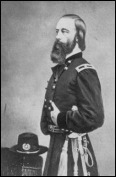Bivouac Books has a nice article web article about an event that my great-great grandfather took part in:
"From Maine to Wisconsin, throughout the spring and summer of 1866, an estimated twenty-five thousand Union and Confederate veterans of the Civil War – members of the Fenian Brotherhood and calling themselves the Irish Republican Army -- gathered along the northern border of the newly-United States for the purpose of invading and capturing Canada."
Here's how it came out:
"Over the next four years several minor border raids were made by small bands of Fenians. In May of 1870, without giving prior public notice as they had in 1866, a force of several thousand well-armed Fenians arrived in Franklin, Vermont. They were again led by General O’Neill. Here they crossed the border and launched the last major attack on Canada by Civil War veterans. This attack also ended in a defeat for the Irish veterans. The I.R.B. then called an end to its efforts to capture Canada.
The Fenians transferred their headquarters from New York City and their military activities to Ireland itself and from there directed all future military ventures against the British. In the United States, the Fenian drive to recruit Civil War veterans to do battle in Canada was curtailed and the Irish Republican Army in America was disbanded. Efforts were directed at fund-raising and smuggling arms and equipment into Ireland for use in the continuing fight for Irish independence. A number of Irish Civil War veterans returned to Ireland to continue the fight on their native soil...a struggle which continues in Northern Ireland and involves the Irish Republican Army to this day."
Thomas Sweeney, one of the Fenian leaders:

My great-great grandfather's name was James J. Heffernan and he was a resident of upstate New York, and fought with the 55th Illinois Cavalry at Shiloh and the siege of Vicksburg, and on towards the sea with Sherman's army.
Over the course of the war, the Illinois 55th traveled 12,000 miles, 3000 of which were on foot. They left 286 dead, buried in 13 states. James enlisted as a Captain, but was promoted in service and mustered out as a Major.
After the war was over, my feisty relative wanted to find some more battles, so he joined with his Fenian Brothers for the Canadian invasion. Rather than send him to jail, it was decided he could take his family out west, so they moved to Salt Lake City, and ended up in what is now the Four Corners area of the American southwest where he tried to find work as a mining engineer.
His last letter to his wife said he was getting ready to sail for Honduras, and had heard good reports of the quantity of "Gold" to be mined there. He capitalized the word every time he wrote it. According to his obituary in Durango (CO) "Idea" he died of malaria in St. Louis on his way back to Colorado from the Honduras trip. My cousins say he is buried at the Jefferson Barracks National Cemetery in St. Louis, and there is also a headstone for him at the cemetery in Durango.
One thing I thought was interesting about his obituary was it said he was born in 1835, but 1880 census records clearly show his age as 52, which would mean he was born in 1828.
Making up a little novel plot in my head, I can see his wife saying he was 7 years younger so she could make herself out to be 46 when he died. He was gone a lot: maybe she had a boyfriend.


